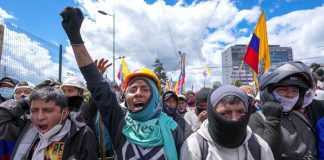South African workers have staged mass protests and strikes over the past two months in a challenge to the new African National Congress (ANC) government.
Burning tyres and building barricades are the actions of workers increasingly angry over the ANC holding wages down and withholding resources to the poor, while favouring white corporations.
Over 100,000 workers have been on strike. Construction workers, retail and chemical workers, nurses, streetsweepers and firefighters have all struck. And although council workers called off action after reaching a deal in early August, more strikes look set to follow.
The township protests and strikes come after the re-election of the ANC in April under new leader Jacob Zuma. Many people, particularly those in the giant trade union federation Cosatu and the South African Communist Party (SACP), argued that the more “leftwing” Zuma was a new start for the ANC.
There is much disappointment after 12 years of former president Thabo Mbeki’s neoliberal policies. Under the ANC, South Africa has become the most unequal country in the world. It is Africa’s most successful economy—but not everyone has benefited.
Neo-liberal policies have hit the poorest hard. Money has been diverted from public spending into funding tax cuts for the rich and middle class.
Corporate tax was slashed from 50 per cent in the early 1990s to less than 30 per cent today, while many black households remain in poverty. There are still 2000 informal settlements in which people live without sanitation and electricity in shacks made of corrugated iron. On average there are ten shack fires a day, killing hundreds of people every year.
The outbreak of national strikes this year follows the month-long action in June 2007, the longest and largest public sector strike in South Africa’s history. It involved over 700,000 workers. There was also a general strike in August 2008.
Unemployment is officially 23 percent but the real figure could be over 40 percent.
Zuma is a pragmatist who has reassured the country’s capitalists that he will not shift South Africa to the left. The strikes and protests have shattered the idea, once floated by Zuma, that a “pact” between businesses, government and unions can address low wages, strikes and inflation.
They have the potential to blow apart the neoliberal consensus of the alliance between the ANC, Cosatu and the SACP.
The climate of rebellion creates immense opportunities and challenges for the South African Left—both to help organise the protests and to unite the struggles of the unemployed township poor and workers into a political alternative to challenge the ANC’s neo-liberalism.
By Tom Orsag





